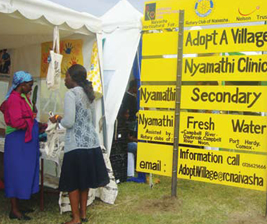By Issabella Wanjiru Drip irrigation is a type of micro-irrigation that has the potential to save water and nutrients by allowing water to drip slowly
Author: admin

Since beginning of May this year, Rob Letcher took over the helm at De Ruiter East Africa as the company’s new Managing Director. Rob has
Rose growers from across the East African region are naturally clamoring for new interesting varieties to include in their production lines. Kordes Roses’ new white codes have drawn a lot of interest from growers. Most have visited their show case recently and discussed some of the varieties that are quite promising. These varieties have been the most popular in trial selections inline with indications that growers are looking premium varieties.
Pallas We expect to be one of a new line of white varieties that will be introduced into the market place. From the trials we have conducted it will be most suited for high altitude, the bud size will be between 6 to 7cm tall, stem length will be 50-80 cm. Transport and vase life are good. Production figures are yet to be concluded, estimates are of 90 to 120 stems m2 at high altitude.
We expect to be one of a new line of white varieties that will be introduced into the market place. From the trials we have conducted it will be most suited for high altitude, the bud size will be between 6 to 7cm tall, stem length will be 50-80 cm. Transport and vase life are good. Production figures are yet to be concluded, estimates are of 90 to 120 stems m2 at high altitude.
Pallas is already in commercial trial in the Mount Kenya region and hopefully by end of 2017 will be introduced commercially onto the market. For now there will be a limited release for what is classified as an auction variety.
To solve the freshwater problem we must first understand how much water is actually available, how much we use, to what purpose, using what system, in what condition, and with what realistic capacity given rapid climate change and its visible and continuing catastrophic effect.
By Peter Neil
To solve the fresh water problem we must first understand how much water is available and how it is being used.
The new water paradigm should begin not at the top of the user pyramid, but at the bottom. It needs a better calculation of our own water footprint, a measure of the amount used to produce each of the goods and services we use, directly and indirectly, including “virtual” water and externalities. There is an excellent online tool to help us understand this process—the Water Footprint Network , founded in the Netherlands by Professor Arjen Hoekstra, and intended to assist individuals, companies, municipalities, and governments with water assessments, to design stewardship plans, and to offer training for new methodologies and project implementation under this new aquacentric approach.
Lake Naivasha is a freshwater lake in the Kenyan Rift Valley. It is unique in that it is home to both an internationally renowned environmental treasure as well as a blossoming agriculture industry that exports high value fresh vegetables and cut flowers to European and English markets.
The Lake is currently under intensive scrutiny over concerns about how its environmental integrity can be maintained whilst still supporting a valuable and growing economy and society. Agricultural activity in the basin has expanded dramatically in terms of both the rural smallholder farmers in the upper catchment and the high value exported commercial horticulture around the Lake and this sector anchors a local economy that supports almost 650 000 people.
The two most valuable crops in the Naivasha basin are cut flowers and vegetables. The vegetables grown in Lake Naivasha contribute approximately KSh6.65 billion ($95 million) to the Kenyan economy. Whilst predominantly focused on producing for the local market, smallholders are increasingly able to access high value export markets through their association as “out growers” with the commercial vegetable farms.
In Africa, and especially in Kenya, sodium is one of the major causes of yield losses, quality reduction and crop failure in irrigated agriculture. Writes Ruth Vaughan.
Soils with a high percentage of sodium in the soil are called sodic soils. Sodic soils negatively impact plant growth for several reasons:
- Specific ion toxicity to sodium sensitive plants.
- Nutrient deficiencies or imbalances in the plants.
- High soil pH – resulting in lock up of phosphates, iron and other micronutrients.
- Dispersion of clay and silt particles in the soil – collapsing the soil structure and blocking soil pores.
Ornamentals are high value and delicate crops which growth requires a technical approach to ensure its optimal development. They need very specific and controlled conditions
 Horticulture is a significant ‘manufacturing’ industry. But where would horticulture be without knowledge exchange? This rhetorical question is the starting point for the Naivasha Horticultural Fair, which was initiated fifteen years ago. The knowledge from these exchanges has been of help to many businesses.
Horticulture is a significant ‘manufacturing’ industry. But where would horticulture be without knowledge exchange? This rhetorical question is the starting point for the Naivasha Horticultural Fair, which was initiated fifteen years ago. The knowledge from these exchanges has been of help to many businesses.
Horti Fair is one of the biggest regional trade fairs for Technology, Innovation and Inspiration in Horticulture. Horti Fair starts where the chain starts: plant breeding, greenhouse technology and cultivation technique. In addition, the Horti Fair showcases the solutions that horticulture offers for global challenges relating to water, food, clean energy and well-being.
“Naivasha Horticultural Fair is an ideal platform for us to directly reach the regions farming industry with all its top growers and decision makers in
Kenya Fights to Wrestle Back EU MarketHorticultural exports are set for an additional standard from next month in a new development by the country to
